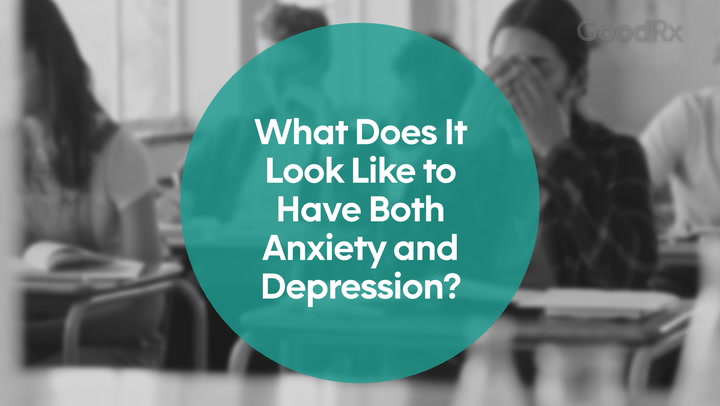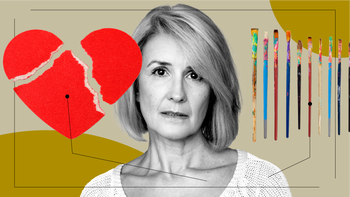
Common Anxiety Medication Names: Know Your Treatment Options
Key takeaways:
Anxiety is a common mental health condition that can cause a variety of symptoms. Medications are one option for treating anxiety.
Common anxiety medications include benzodiazepines, selective serotonin reuptake inhibitors (SSRIs), and serotonin and norepinephrine reuptake inhibitors (SNRIs).
Brand and generic anxiety medication names can be confusing to remember. Double check with your healthcare provider or pharmacist if you’re unsure whether a medication is being used to treat anxiety symptoms.

Generalized anxiety disorder (GAD or anxiety) is the most common mental health condition in the U.S., affecting over 40 million adults. Some people have mild symptoms, such as a slight feeling of nervousness. Others have more severe symptoms, such as a raised heart rate, overwhelming fear of certain situations, or sudden feelings of panic.
Anxiety can take many forms and affect people differently. The good news is anxiety is also highly treatable. Anxiety medications first became available in the 1950s and have grown in number since then. Decades of research have helped experts learn how to better help people lessen their symptoms and improve their quality of life.
Because anxiety medications have been around for so long, there are several different types of medications, different names, and even different ways the medications work. All of that information can be confusing when trying to understand your options for treating anxiety.
SHINGRIX (Zoster Vaccine Recombinant, Adjuvanted) is now $0 for almost everyone*
Get SHINGRIX at the pharmacy or in-network doctor’s office today. 98% of privately insured people pay $0 and all Medicare Part D beneficiaries pay $0 at the pharmacy.
Prescribing Information
*Coverage and cost may vary and are subject to change without notice. Reimbursement decisions are made by individual insurance plans.


SHINGRIX is an FDA-approved vaccine for the prevention of shingles (herpes zoster) in adults 50 years and older. SHINGRIX is not used to prevent chickenpox.
• You should not receive SHINGRIX if you are allergic to any of its ingredients or had an allergic reaction to a previous dose of SHINGRIX
• An increased risk of Guillain-Barré syndrome (severe muscle weakness) was observed after vaccination with SHINGRIX
• Fainting can happen after getting injectable vaccines, including SHINGRIX. Precautions should be taken to avoid falling and injury due to fainting
• The most common side effects are pain, redness, and swelling at the injection site, muscle pain, tiredness, headache, shivering, fever, and upset stomach
• SHINGRIX was not studied in pregnant or nursing women. Tell your healthcare provider if you are pregnant, plan to become pregnant, or are breastfeeding
• Vaccination with SHINGRIX may not protect all individuals
• Ask your healthcare provider about the risks and benefits of SHINGRIX. Only a healthcare provider can decide if SHINGRIX is right for you
You are encouraged to report vaccine adverse events to the US Department of Health and Human Services. Visit www.vaers.hhs.gov to file a report, or call 1-800-822-7967.
For US audiences.
Trademarks are property of their respective owners.
©️2024 GSK or licensor.
PMUS-SGXWCNT240015 May 2024
Produced in the USA.
GoodRx Health information and resources are reviewed by our editorial staff with medical and healthcare policy and pricing experience. See our editorial policy for more detail. We also provide access to services offered by GoodRx and our partners when we think these services might be useful to our visitors. We may receive compensation when a user decides to leverage these services, but making them available does not influence the medical content our editorial staff provides.
Let’s take a look at the most common anxiety medication names available.
Common anxiety medication names and classes
There are many different classes of anxiety medications. Each class has unique characteristics that help treat anxiety symptoms and improve quality of life. Healthcare providers may use one or more medications from different classes to best treat a person’s symptoms. Below, we’ll discuss some of the most common anxiety medication classes.
Benzodiazepines
Benzodiazepines relieve anxiety symptoms by causing certain brain cells to relax. They can work very quickly. Benzodiazepines are typically recommended as short-term treatments or to be used only when needed. For example, a person may take a dose during panic attacks.
One important note about benzodiazepines is their risk for dependence and misuse. Because of this, they’re considered controlled substances by the U.S. Drug Enforcement Administration (DEA). This means there are strict rules regarding how they’re prescribed and dispensed.
Some of the most common anxiety medication names in this class include:
Alprazolam (Xanax)
Clonazepam (Klonopin)
Diazepam (Valium)
Lorazepam (Ativan)
Selective serotonin reuptake inhibitors (SSRIs)
Selective serotonin reuptake inhibitors (SSRIs) work by raising levels of a chemical called serotonin in the brain. Serotonin helps regulate mood and feelings of anxiety. By raising serotonin levels, SSRIs can help relieve anxiety symptoms.
SSRIs are considered first-choice options for treating anxiety. But they can take several weeks to start working. So don’t get discouraged if you start an SSRI and don’t feel any improvement right away.
Only two SSRIs are FDA-approved to treat anxiety: escitalopram (Lexapro) and paroxetine (Paxil). Sometimes, healthcare providers will still prescribe other medications in this class for this purpose. This is considered an off-label use. Even without FDA approval, clinical evidence supports the use of most SSRIs for anxiety.
Serotonin and norepinephrine reuptake inhibitors (SNRIs)
Serotonin and norepinephrine reuptake inhibitors (SNRIs) also work by raising levels of serotonin in the brain. But they also raise levels of another chemical messenger called norepinephrine. Norepinephrine helps boost your energy levels and focus. So SNRIs can help stabilize your mood and make you feel more energized.
The most common SNRIs prescribed to treat anxiety are venlafaxine extended-release (Effexor XR) and duloxetine (Cymbalta).
Other common anxiety medications
There are other common anxiety medication names you may have heard of that we haven’t discussed yet.
Hydroxyzine (Atarax, Vistaril) is an antihistamine. Hydroxyzine works by blocking a chemical called histamine, which makes you sleepy. It also boosts the effects of serotonin. This is the only antihistamine that has effects on serotonin. Hydroxyzine’s unique effect on serotonin is why it’s the only antihistamine used in the treatment of anxiety. However, it’s not considered a first choice for anxiety.
Buspirone belongs to the azapirone class of medications. The way buspirone works for anxiety isn’t fully understood. But it’s thought to activate certain areas of the brain where serotonin attaches. This may make serotonin more active.
Like hydroxyzine, buspirone isn’t a first-choice anxiety medication. But it may be a good choice for people who can’t tolerate SSRIs or SNRIs. It might also be an option for those worried about the risks of dependence and misuse with benzodiazepines.
What is the best medication for anxiety — generic or brand name?
Finding the best anxiety meds for you may require some trial-and-error. And, you may want to take medication costs into consideration.
Generic anxiety medications are typically less expensive than brand names. But it’s not uncommon to wonder whether there will be a difference in effect between brand-name and generic medications.
In regard to effectiveness, the FDA requires generic manufacturers to prove their products can be substituted for brand-name medications and offer the same benefits. Generic medications are formulated to perform the same as brand-name medications. They contain the same active ingredients and are equal to brand names in terms of quality, dosage, and strength. But they may be a different shape, color, or size.
Pharmacies typically dispense generic medications if they’re available, unless a prescriber has specifically asked them not to. So chances are when you pick up your anxiety medication, you’ll receive the generic version. Switching to a different medication requires a discussion with your healthcare provider.
Concerns about the cost of a medication are an important part of any conversation you may have with your healthcare provider. The last thing your provider wants is for the cost of a medication to prevent you from being able to take it. If your anxiety medication is too expensive, talk to your healthcare provider to see if a cheaper alternative is available.
Generic anxiety medications prices
To help remember all these anxiety medication names, here’s a quick reference chart with the medication’s generic name and brand name. We’ve also included the medication’s average retail cost and how much you might save by using a GoodRx coupon.
| Generic name | Brand name | Average retail cost | GoodRx price |
|---|---|---|---|
| Buspirone (30 tablets, 10 mg each) | Buspar (brand name discontinued) | About $12 | As low as $5 |
| Duloxetine (30 capsules, 60 mg each) | Cymbalta | About $123 | As low as $8 |
| Escitalopram (30 tablets, 10 mg each) | Lexapro | About $53 | Less than $7 |
| Hydroxyzine hydrochloride (30 tablets, 25 mg each) | Atarax (brand name discontinued) | About $17 | Less than $8 |
| Hydroxyzine pamoate (30 capsules, 25 mg each) | Vistaril | About $15 | Less than $5 |
| Paroxetine (30 tablets, 20 mg each) | Paxil | About $24 | As low as $7 |
| Venlafaxine extended-release (30 capsules, 150 mg each) | Effexor XR | About $81 | Less than $12 |
The bottom line
Anxiety is an issue that many people face every day. Symptoms can span a wide range from a mild nervous feeling to severe panic attacks that affect daily life. However, anxiety is treatable and there are many ways to treat it. Your healthcare provider can use different medications to find the best treatment plan for you.
Some of the most common anxiety medications include SSRIs and SNRIs. Benzodiazepines are also commonly prescribed for short periods of time or as needed. Sometimes, brand and generic anxiety medication names can be confusing. Talk with your healthcare provider or pharmacist to learn more about the anxiety medication you take.
Why trust our experts?



Munir, S., et al. (2022). Generalized anxiety disorder. StatPearls.
National Alliance on Mental Illness. (2017). Anxiety disorders.
Powers, M., et al. (2015). Clinical practice review for GAD. Anxiety and Depression Association of America.
Votaw, V. R., et al. (2019). The epidemiology of benzodiazepine misuse: A systematic review. Drug and Alcohol Dependence.
Wilson, T. K., et al. (2022). Buspirone. StatPearls.
For additional resources or to connect with mental health services in your area, call SAMHSA’s National Helpline at 1-800-662-4357. For immediate assistance, call the National Suicide Prevention Lifeline at 988, or text HOME to 741-741 to reach the Crisis Text Line.

























